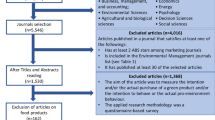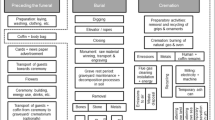Abstract
This paper introduces the discrete choice model-paradigm of Random Regret Minimization (RRM) to the field of environmental and resource economics. The RRM-approach has been very recently developed in the context of travel demand modelling and presents a tractable, regret-based alternative to the dominant choice-modelling paradigm based on Random Utility Maximization-theory (RUM-theory). We highlight how RRM-based models provide closed form, logit-type formulations for choice probabilities that allow for capturing semi-compensatory behaviour and choice set-composition effects while being equally parsimonious as their utilitarian counterparts. Using data from a Stated Choice-experiment aimed at identifying valuations of characteristics of nature parks, we compare RRM-based models and RUM-based models in terms of parameter estimates, goodness of fit, elasticities and consequential policy implications.
Similar content being viewed by others
References
Arentze TA, Timmermans HJP (2007) Parametric action trees: incorporating continuous attribute variables into rule-based models of discrete choice. Transp Res B 41(7): 772–783
Beharry-Borg N, Hensher DA, Scarpa R (2009) An analytical framework for joint versus separate decisions by couples in choice experiments: the case of coastal water quality in Tobago. Environ Resour Econ 43: 95–117
Bell DE (1982) Regret in decision making under uncertainty. Oper Res 30(5): 961–981
Ben-Akiva M, Lerman SR (1985) Discrete choice analysis: theory and application to travel demand. The MIT Press, Cambridge
Ben-Akiva ME, Swait J (1986) The Akaike likelihood ratio index. Transp Sci 20(2): 133–136
Bullock C, Elston D, Chalmers N (1998) An application of economic choice experiments to a traditional land use deer hunting and landscape change in the Scottish Highlands. J Environ Manag 52: 335–351
Cameron TA, De Shazo JR (2010) Differential attention to attributes in utility-theoretic choice models. J Choice Model (forthcoming)
Campbell D, Hutchinson WG, Scarpa R (2008a) Incorporating discontinuous preferences into the analysis of discrete choice experiments. Environ Resour Econ 41: 401–417
Campbell, D, Hutchinson, WG, Scarpa, R, Birol, E, Koundouri, P (eds) (2008b) Using mixed logit models to derive individual-specific WTP estimates for landscape improvements under agri-environmental schemes: evidence from the Rural Environment Protection Scheme in Ireland 3 Choice experiments informing Environmental Policy. Edward Elgar, Cheltenham, pp 58–81
Chorus CG (2010) A new model of random regret minimization. Eur J Transp Infrastruct Res 10(2): 181–196
Chorus CG (in press) Random regret minimization: an overview of model properties and empirical evidence. Transp Rev
Chorus CG, de Jong GC (2011) Modeling experienced accessibility for utility-maximizers and regret-minimizers. J Transp Geogr 19(6): 1155–1162
Chorus CG, Rose JM (2011) Selecting a date: a matter of regret and compromises. Paper accepted for presentation at the 2nd international choice modeling conference, Leeds
Chorus CG, Molin EJE, van Wee GP, Arentze TA, Timmermans HJP (2006) Responses to transit information among car-drivers: regret-based models and simulations. Transp Plan Technol 29(4): 249–271
Chorus CG, Arentze TA, Timmermans HJP (2009) Spatial choice: a matter of utility or regret?. Environ Plan B 36(3): 538–551
Connolly T, Reb J (2005) Regret in cancer-related decisions. Health Psychol 24(4): 29–34
Coricelli G, Critchley HD, Joffily M, O’Doherty JP, Sirigu A, Dolan RJ (2005) Regret and its avoidance: a neuroimaging study of choice behaviour. Nat Neurosci 8(9): 1255–1262
DeShazo JR, Cameron TA, Saenz M (2009) The effect of consumers’ real-world choice sets on inferences from stated preference surveys. Environ Resour Econ 42: 319–343
Ferrini S, Scarpa R (2007) Designs with a-priori information for nonmarket valuation with choice-experiments: a Monte Carlo study. J Environ Econ Manag 53: 342–363
Hanley N, Wright R, Koop G (2002) Modelling recreation demand using choice experiments: climbing in Scotland. Environ Resour Econ 22: 449–466
Hearne RR, Salinas ZM (2002) The use of choice experiments in the analysis of tourist preferences for ecotourism development in Costa Rica. J Environ Manag 65: 153–163
Hensher DA, Beck MJ, Rose JM (2011) Accounting for preference and scale heterogeneity in establishing whether it matters who is interviewed to reveal household automobile purchase preferences. Environ Resour Econ 49(1): 1–22
Hensher DA, Greene W, Chorus CG (forthcoming) Random regret minimisation or random utility maximisation: an exploratory analysis in the context of automobile fuel choice. J Adv Transp
Herriges JA, Phaneuf DJ (2002) Inducing patterns of correlation and substitution in repeated logit models of recreation demand. Am J Agric Econ 84(4): 1076–1090
Johnston R, Duke JM (2007) Willingness to pay for agricultural land preservation and policy process attributes: does the method matter?. Am J Agric Econ 89: 1098–1115
Kivetz R, Netzer O, Srinivasan V (2004) Alternative models for capturing the compromise effect. J Market Res 41: 237–257
Loomes G, Sugden R (1982) Regret-theory: an alternative theory of rational choice under uncertainty. Econ J 92(368): 805–824
Loomes G, Sugden R (1983) A rationale for preference reversal. Am Econ Rev 73(3): 428–432
McFadden D (1974) Conditional logit analysis of qualitative choice-behaviour. In: Zarembka P (eds) Frontiers in econometrics. Academic Press, New York
Meyerhoff J, Ohl C, Hartje V (2010) Landscape externalities from onshore wind power. Energy Policy 38: 82–92
Morey E, Thiene M (submitted) A parsimonious, latent-class methodology for predicting behavioural heterogeneity in terms of life-constraint heterogeneity
Morey E, Thacher J, Breffle W (2006) Using angler characteristics and attitudinal data to identify environmental preference classes: a latent-class model. Environ Resour Econ 341: 91–115
Quiggin J (1994) Regret theory with general choice sets. J Risk Uncertain 8(2): 153–165
Sarver T (2008) Anticipating regret: why fewer options may be better. Econometrica 76(2): 263–305
Savage LJ (1954) The foundations of statistics. Wiley, New York
Scarpa R, Rose JM (2008) Design efficiency for non-market valuation with choice modelling: how to measure it, what to report and why. Aust J Agric Resour Econ 52: 253–282
Scarpa R, Thiene M (2005) Destination choice models for rock-climbing in the North-Eastern Alps: a latent-class approach based on intensity of preferences. Land Econ 85(3): 426–444
Scarpa R, Campbell D, Hutchinson WG (2007) Benefit estimates for landscape improvements: sequential Bayesian design and respondents’ rationality in a choice experiment study. Land Econ 83(4): 617–634
Scarpa R, Thiene M, Train K (2008) Utility in WTP space: a tool to address confounding random scale effects in destination choice to the Alps. Am J Agric Econ 90(4): 994–1010
Scarpa R, Gilbride TJ, Campbell D, Hensher DA (2009) Modelling attribute non-attendance in choice experiments for rural landscape valuation. Eur Rev Agric Econ 36(2): 151–174
Simonson I (1992) The influence of anticipating regret and responsibility on purchasing decisions. J Consumer Res 19(1): 105–119
Swait J (2001) A non-compensatory choice model incorporating attribute cutoffs. Transp Res B 35: 903–928
Thiene M, Scarpa T (2008) Hiking in the Alps: exploring substitution patterns of hiking destinations. Tour Econ 14(2): 263–282
Thiene M, Scarpa R (2009) Deriving and testing efficient of WTP distributions in destination choice models. Environ Resour Econ 4: 379–395
Train KE (2009) Discrete choice methods with simulation, 2nd edn. Cambridge University Press, Cambridge
Vermeulen B, Goos P, Scarpa R, Vandebroek ML (2010) Conjoint choice designs to measure the WTP. Environ Resour Econ (forthcoming)
Zeelenberg M (1999) The use of crying over spilled milk: a note on the rationality and functionality of regret. Phil Psychol 12(3): 325–340
Zeelenberg M, Pieters R (2007) A theory of regret regulation 1.0. J Consumer Psychol 17(1): 3–18
Zhang J, Timmermans HJP, Borgers A, Wang D (2004) Modelling traveler choice behavior using the concepts of relative utility and relative interest. Transp Res B 38(3): 215–234
Author information
Authors and Affiliations
Corresponding author
Rights and permissions
About this article
Cite this article
Thiene, M., Boeri, M. & Chorus, C.G. Random Regret Minimization: Exploration of a New Choice Model for Environmental and Resource Economics. Environ Resource Econ 51, 413–429 (2012). https://doi.org/10.1007/s10640-011-9505-7
Accepted:
Published:
Issue Date:
DOI: https://doi.org/10.1007/s10640-011-9505-7




